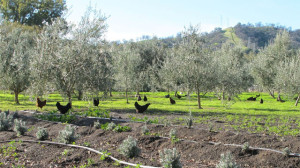
Photo: Niku Sharei
Extensive research was not required, Solis notes, for him to discover the back- and heart-breaking nature of farming. I accompanied the author on a visit to Soul Food Farm in Vacaville, where we walked in the shade of olive trees and breathed in the scent of lavender blooms as chickens pecked at our feet. Solis talked at length with the farm’s owner, Alexis Koefoed, about her pastured chicken operation. “Farming is physically hard work,” Koefoed told Solis. “If you don’t love it, you can’t do it. You will resent every moment you’re on this place.”
Koefoed went on to describe how she lost an entire year’s work when another farmer brought a virus onto her farm, most likely on the soles of his boots. Not long after, hundreds of Koefoed’s birds sickened and died. She recovered from that setback and went on to garner top Bay Area clients like Chez Panisse and Prather Ranch Meat Company. But last year Koefoed had to shutter the poultry and egg portion of her farm when grain prices rose during a drought in the Midwest. Koefoed is now looking to retool and diversify her business to keep the farm afloat.

Photo: Niku Sharei
Solis’ research and play examine the challenges many small farmers face, but they also plumb his own anxieties. At one point in his script, a character called Thin Man mocks the farmer, Danny: “Family? What good are they now? Except to remind you of your failure. Of how they didn’t get new clothes this year ’cause you needed to pay your water bill.”
Solis says he’s “always intrigued with those stories of darkness and despair and distress,” which tap into his own fears as a farmer.

50th wedding anniversary of Lauren Gunderson’s grandparents; courtesy Gunderson family
Lauren Gunderson’s play opens in a very different setting, a kitchen where a mom and her teenage daughter confront each other over a coconut cake. “No one feels like a party, everyone is angry, everyone is sad,” says the teenaged character, Jamie, in the script’s current version. “So why are we kidding ourselves?” Her mother replies, “We stop and mark these days because they are fast gone.”
In Gunderson’s play A Cake, several generations of women come and go, while the cake stays in the center of the stage. Depending on the situation, the cake is seen as a gift, a reproach, a test and even a way to snag a husband.
Like Solis, Gunderson conducted hands-on research to inform her play. She asked her sister, a pastry chef, to show her how to bake a cake from scratch. Donning aprons in the kitchen of her flat overlooking Coit Tower, Gunderson and her sister Kathryn sifted flour and measured sugar and talked about their grandmother and mother.
“Food for me is so intimately about family, history, and memory,” says Gunderson. “It never leaves us, it never goes very far away.”
When the plays are ready, Berkeley Rep Artistic Director Tony Taccone envisions a multi-day series of performances that will include meals and audience participation. One of Taccone’s ideas for a title is “All You Can Eat.” The Berkeley Rep is looking at fall of next year as a possible premiere date.





